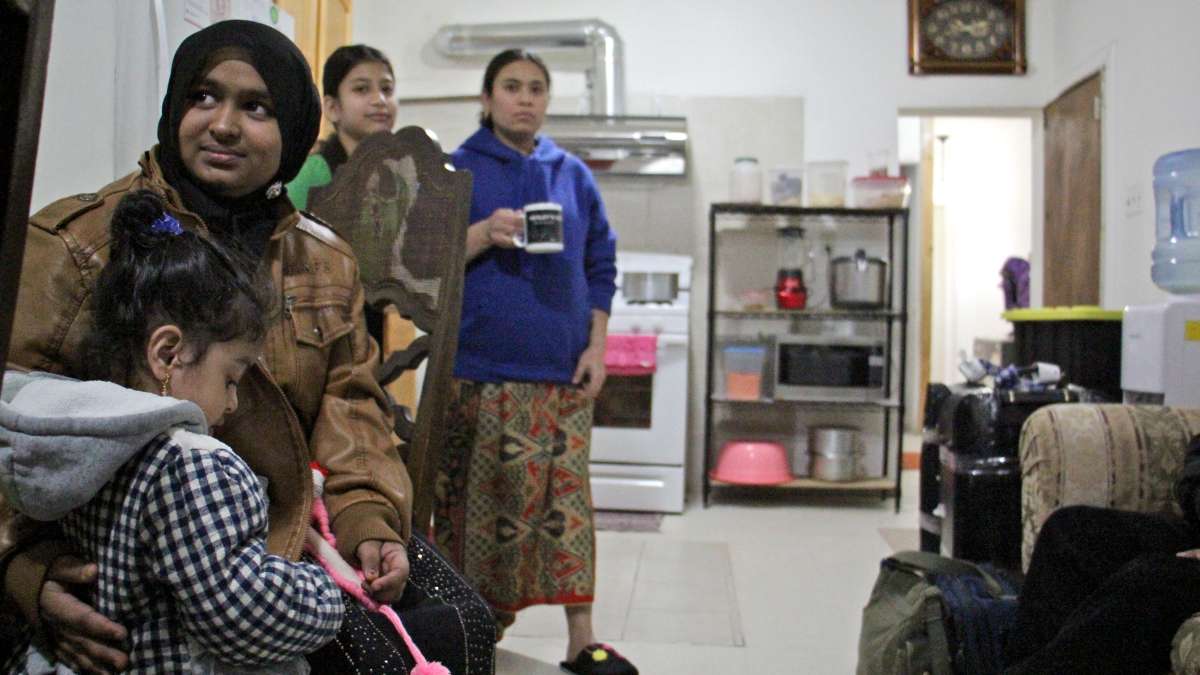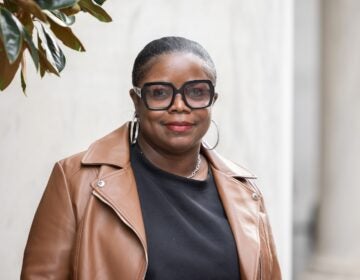Burmese family among the last refugees to arrive in Philadelphia before Trump order officially takes effect
ListenThe car door swung open and Mohammad Hasan stepped out into the cold night air, his sleeping toddler against chest, his wife Noor climbing slowly out of the back seat.
Their first steps in Philadelphia were onto the unexciting blacktop of a Philadelphia International Airport parking lot. But the lot might as well have been paved with pearls, considering the smiles that brightened their weary faces.
Tuesday was the last day of a long journey that started in 2004, when Hasan fled religious persecution in his homeland of Burma. Mohammad, his wife Noor Azizah and their 3-year-old daughter (also named Noor) are Rohingya Muslims. Human rights advocates consider Rohingyas to be the most persecuted ethnic minority in the world. Some even use the word “genocide” to describe the atrocities they have suffered in Burma, a majority-Buddhist country.
“Burma’s government was killing us. They discriminated against us. That’s why I fled from Burma,” Hasan said, speaking through an interpreter Tuesday night. “From Burma, I went to Thailand on a boat. From Thailand, I went to Malaysia. From Malaysia, I wanted to go to Australia. But we got caught by the Indonesian government. I was in Indonesia for six or seven years. From there, we were sent to the United States.”
The family will stay in South Philadelphia with Hasan’s cousin Ismail Amin, a refugee himself who immigrated here years ago, for several days until resettlement workers help them find their own apartment nearby. The men swapped the broad smiles, handshakes and hugs of relatives who haven’t seen each other in years.
“Today, I am so happy that my brother standing here come to USA,” Amin said of Hasan, who he considers a brother. “Thank you so much. So thank you so much, NSC, I thank you so much for you.”
The chance for a new life here almost didn’t happen.
Following campaign promises to tighten America’s borders, President Trump signed an executive order last Friday intended to slow the flow of foreigners entering the United States. The most controversial aspects of the order blocked visitors from seven Muslim-majority countries for 90 days, a move critics have decried as an unconstitutional “Muslim ban,” and indefinitely barred Syrian refugees, whose plight Unicef has called “the largest humanitarian crisis since World War II.”
The order also affected refugees from other countries: Trump plans to halve the number of refugees allowed to enter the country from a maximum of 110,000 this year to 50,000. And the order suspended all refugee admissions for four months until Homeland Security can review screening processes.
Still, the president’s order doesn’t take full effect until this Friday.
That means refugees who already have gotten all required approvals have a very narrow window to still settle here. Hasan’s family, for example, were the first refugees to arrive in Philadelphia since Trump signed the order. Another handful are expected to arrive Wednesday and Thursday.
Refugees set to arrive Friday through next week, though, will have to stay put.
That could be catastrophic for many refugee families, said Juliane Ramic, senior director of refugee and community integration for the Nationalities Services Center (NSC). Many of the required medical and security clearances that refugees need to make the trip could expire, so once refugees are allowed to come again, they likely will have to be screened all over again, Ramic explained. The current screening process takes up to two years, she added.
“With the stoppage in the program, we are going to have to make the calls tomorrow to tell the refugees that their relatives won’t be coming, at least for 120 days. It will be months after that, or even more, maybe even years.”
Ramic’s group expected to welcome 565 refugees to Philadelphia this year. Ten were scheduled to arrive next week, including an Iraqi mother and her baby, and a 13-year-old Burmese boy trying to rejoin his father here. With the refugee restrictions taking full effect Friday, their travel plans have been cancelled.
In Philadelphia, the federal government has contracts with three agencies — NSC, HIAS-Pennsylvania and the Bethany Christian Services — to resettle refugees. Altogether, the three groups helped nearly 1,000 refugees resettle in Philadelphia the last fiscal year. About 3 million refugees have resettled in America since 1980, according to the Pew Research Center. In recent years, most have come from the Democratic Republic of Congo, Syria, Burma, Iraq and Somalia.
A Ugandan refugee, who HIAS-PA expects to welcome to Philadelphia Thursday, likely will be the last refugee to arrive in Philadelphia before the suspension kicks in, said Rona Buchalter, HIAS-PA’s director of refugee resettlement.
The group’s funding is based on how many refugees they assist. With a four-month suspension on admissions, agency workers suddenly find themselves worrying about their own fates, in addition to those of the stranded refugees.
“We’re obviously worried about our clients, but we’re also worried about the staff here and whether we’ll be able to keep our doors open and provide these services in the future,” said Buchalter said. “We are thinking about every eventuality. There are so many questions, and there has been so little guidance, and it was all done so quickly.”
Some have started fund-raising, so that they can continue helping refugees who recently arrived and hit the ground running whenever the suspension is lifted.
Back in South Philadelphia, Amin’s neighborhood is full of resettled refugees and immigrants. Meh Sha Lin lives a few doors down and across the street. He ignored the clock, as it inched toward midnight, to go greet Hasan and his family as they carted their luggage into Amin’s rowhome. It was only 10 years ago that Lin, who’s originally from Burma, arrived as a wide-eyed teenager on the same block, after fleeing to the United States with his mother and his sister from a refugee camp in Thailand.
“My future, since I stepped in America, is truly changed, truly changed,” said Lin, who had never ridden in a car nor touched a computer before coming to the United States.
Trump’s order troubles him.
“I would like to say thank you to Mr. Trump (for being) President of United States,” Lin said. “But I just want to say, this is the word from my deep heart, please do not kill American future dream. When we live in our country, we cannot go whenever we want. Here, you can walk around any block you want. You want to walk through 2nd Street or 22nd Street? No problem, go. Nobody stop you and ask you identification. To me, America is freedom. America is future dream.”
Lin still has a brother in Thailand trying to immigrate here.
“If now, the president stops refugees, we’re going to lose one of our family members forever,” said Lin, whose sister later named her two young daughters Juliane and Emily after the NSC workers who met them that night.
Lin vowed to help his new neighbors, Hasan and his family, as much as he can.
“The next couple days, they’re gonna see a lot of things they never seen in their life,” Lin said. “I am definitely gonna help them, because I know how hard the refugee life is.”
WHYY is your source for fact-based, in-depth journalism and information. As a nonprofit organization, we rely on financial support from readers like you. Please give today.














